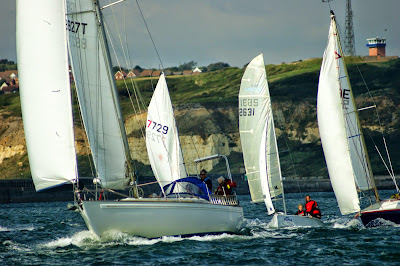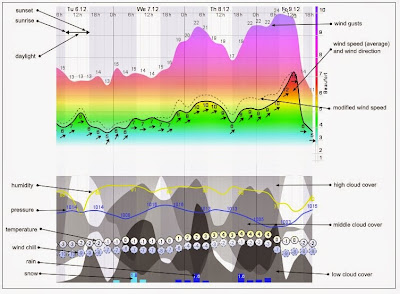My first take on Saloman (1997) 'Of mind and media', ran to 3,800 words, my second take is still 2,800 ... (See below, it's my previous blog entry).
Now that I've devoured the text I'll consider the questions.
Do you prefer certain forms of representation to a greater extent than others?
1. The only kind of learning that matters is learning that works. This will vary by context, content and desired outcomes. A piece of chalk on a blackboard is learning, as is Avatar. The first might cost $1, the latter $200m.
If so, why do you think that is the case?
2. We cannot always indulge our differences. I dare say the best education might be privileged and historically at home with a governess then a tutor. Personalisation by yourself, aided by parents/siblings peer pressure and your school/institution is what e-learning offers via social networking, forums, YouTube, Tumblr, Facebook, Wikipedia, Google and all the rest of them.
Does this preference apply to everything you attempt to learn?
3. If I am motivated to do so I will do more than watch the TV programme or catch the radio show ... I will do more than buy the book (or books), I will do a course, join a group, get a qualification. It is progressive, exploratory and stepped; it ends in your head, and may begin on your own but is often best developed with others. Though ask a successful author how they developed their craft skills or how they now work and I doubt they say they do it as a group/collective in a writer's group.
Or does it vary from one type of learning task to another?
4. Whilst certain approaches, if there is a choice, do lend themselves better to certain ways of doing it, any learning is defined by the candidate's motivation to learn and what is available, let alone their individual circumstances. I do think that challenging someone to learn might deliver a better outcome than spoon-feeding or mollycoddling. I learnt to deliver a baby when I had to, I had about five minutes to read a very short chapter on 'home delivery'. I learn to sail when it went wrong and we escaped drowning. I learnt to make training films by making mistakes (and putting them right). I once saw a production of Sleuth that was performed in front of the curtains with none of the pyrotechnics or gadgets ... in this simple form it was more engaging. i.e. I am going back to the story told around a campfire, perhaps with a song. This is how to enjoy Beowulf rather than as a movie.
Does the article make you think differently about what you do?
5. The article irritated me. It is 4, 800 words long. The first half could be removed entirely. Editorially I would have put a line through the waffle and a red line over disagreements. I have a paragraph of what I'd fix that I'll post in my blog. It should have been edited to improve what is poor writing. However, it is this disagreement and the 'mistakes' that have rattled me and so got my attention. How therefore to create a tussle with the text or concepts? They do it at Oxford, it's called a debate.
To what extent do the technologies available limit the learning and teaching possibilities in terms of forms of representation?
6. The technologies are not the limiting factor, they are only possibilities. The limiting factor is the author of the learning - bells and whistles do not improve a lesson if the teacher hasn't a) got an idea b) prepared a 'script' that has some chance of success.
Can you describe any specific examples of how different forms of representation are an important influence on teaching and learning situations with which you are familiar?
7. In H808 we did a group task that had to end with a presentation/representation of some kind. We had powerpoint presentations, and videos but to my surprise as I had doubted it would work one group did a poster that was rich, comprehensive, inventive, memorable and in one shot said it all - indeed with the flows and movement of information about the page I'd even described it as interactive. i.e. Keep It Simple, Student. I've been using a Kindle poolside to show swimmers pages from the 'Swim Drill Book'. It has proved extraordinarily effective.
To what extent do assessment methods constrain or privilege certain forms of representation (for example, how much does a written examination reveal about a learner’s competence in communicating effectively in a second language?).
8. Testing is more vital for the learning process than as a test to achieve a grade, pass or mark. But of course assessment is crucial for the sake of credibility and to have something to open a door to work. A written test tests someone's comprehension of the language and confidence/ability with this language first. Interesting for the last year I've been feeding my learning back to a national sports organisation. I have been fairly critical of a written test for sports coaches as it is at odds with the way they learn and what they do ... it was dropped from the curriculum last week. I had read during H807 or H808 about how the thing to be taught, the approach to teaching it and the way it is assessed should all marry up. i.e. to teach someone to dive Kate are they ever going to have to go near or in water? Of course they are. At what point does their reading or writing skill hinder their ability to qualify? If you want to learn to sail someone had to give you the helm; my father would never do so! I went off and did a course without telling him so that should he fall over board I'd know how to get back to shore. The ultimate tests I have windsurfing and skiing have been where errors would be fatal ... though I'm not suggesting a test should be a life or death matter, though it wouldn't half concentrate your mind.
Finally, I spent this morning with a colleague/friend who did an e-learning diploma with Sussex University.
We shared favourite e-learning websites and the ones we hated the most. I came away rather depressed by the awfulness of many, their formulaic approach and dreadful written and spoken English - there is a lack of craft skills. I think these things have been designed and created with the context in which the learning will take place in mind or the multiple opportunities people can and will find to engage with a task or topic. Personally, I like to hear and see it from several sources, good and bad, then give it a go several times ... and in time form an opinion having done what I'm doing here and did this morning over coffee - batting it about.
We liked Spaced-ed and can see what they are doing with Qstream ... though our own e-learning will naturally engage even more than these!
I came away with key ideas such as: metaphor, variety, mistakes, context, relevance and participation.
REFERENCE
Salomon, G 1997, 'Of mind and media', Phi Delta Kappan, 78, 5, p. 375, Academic Search Complete, EBSCOhost, viewed 8 March 2011.



